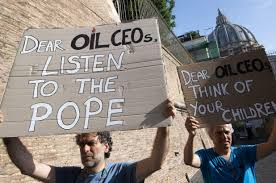Four years ago today, Pope Francis’ encyclical Laudato si’ was published. Its message is as urgent as ever. In it Pope Francis wrote of the “urgent challenge to protect our common home” (#13), and he added, “I urgently appeal, then, for a new dialogue about how we are shaping the future of our planet” (#14).
Sadly, last week, the pope needed to reiterate this challenge and appeal. In a meeting at the Vatican with oil executives His Holiness urged that, “faced with a climate emergency, we must take action accordingly, in order to avoid perpetrating a brutal act of injustice towards the poor and future generations.”
An anniversary is the perfect time to recommit ourselves to our vocation to care for creation. The new pastoral letter, “God Calls Us All to Care for Our Common Home,” issued today by the California Catholic Bishops is a fitting and helpful example. Another way to respond is to study the resources available at Catholic Climate Covenant, where programs, resources, and teachings are made available. On June 27-29th, it will co-sponsor with Creighton University an initial conference on Laudato si’ and the U.S. Catholic Church.
In addition, parishes, churches, and other groups of Christians in recent months have been demonstrating, marching, protesting, issuing statements, and more. A number of theologians and ethicists, too, are signing a statement on Christian ethics, the climate emergency (Pope Francis’s words above), and nonviolent direct action given the urgency of our present situation. If you are a theologian, ethicist, or religious leader, and would like to add your name to the list of signatories, send an email to me (my email address is at the end of the statement).
Almost 30 years ago, in his World Day of Peace Message in 1990, Pope Saint John Paul II wrote, “An education in ecological responsibility is urgent: responsibility for oneself, for others, and for the earth” (#13). He also noted that “a true education in responsibility entails a genuine conversion in ways of thought and behaviour. Churches and religious bodies, non-governmental and governmental organizations, indeed all members of society, have a precise role to play in such education.”
While we still need such education, the part about behavior, or action, is now even more urgent. As Pope Francis told the oil executives this past week: “Time is running out! Deliberations must go beyond mere exploration of what can be done and concentrate on what needs to be done from today onward.” He added, “We do not have the luxury of waiting for others to step forward or of prioritizing short-term economic benefits. The climate crisis requires our decisive action, here and now.”



